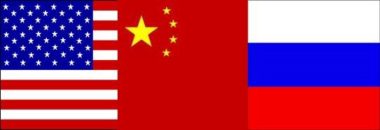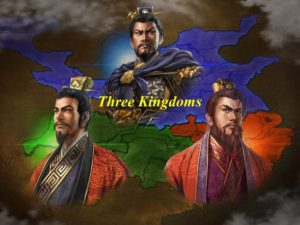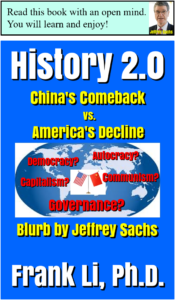By “three new kingdoms”, I mean the U.S., China, and Russia. I call them the “three new kingdoms”, because of their striking resemblance to the “three kingdoms” in ancient China. The three new kingdoms have been fighting against one another since 1945 and will continue to do so in the coming decades.
1. The three kingdoms
Read Wikipedia – Three Kingdoms.
2. The three kingdoms: an overview
The “Three Kingdoms” is one of the best documented, most exciting, and best-filmed stories in human history (Three Kingdoms, with English Subtitle).
Five highlights:
- All three kings of the three kingdoms wanted to be the Emperor of China.
- They fought among themselves via various wars, but the “national” strategy for the two smaller kingdoms was always the same: we must gang up against the big guy, because “if one of us is destroyed, the big guy will then destroy the other”.
- Leadership was everything, with the king having the ultimate responsibility and accountability. A self-made king was an able man by definition. However, he often had one paramount goal: leaving a great legacy behind. Because of that, he often rushed to achieve an “impossible” goal (e.g., “unifying China in my lifetime”), which often resulted in a disaster. On the other hand, a king by inheritance was often not very able.
- War was too important to be left to a general, who was often overly obsessed with winning the battle but failed to fit it into the national strategy. For example, when two allies attacked an enemy and started chasing the enemy’s general, your general might want to kill him to declare victory and even make history. However, your national strategy might require that your general just chase the enemy’s general to the other side and let your ally kill him so that the enemy would later take revenge against your ally, not you.
- Self-destruction was often more damaging to a kingdom than anything external.
3. The three new kingdoms
After WWII, the world was divided into two major parts: The West led by the U.S., and the East led by the USSR, with the Cold War between them. Furthermore, China’s Mao was just too big to be truly a member of the East. So, China separated itself from the East in the 1960s as a third part.
These three new “kingdoms” have been fighting against one another since then, with the U.S. being the big guy for much, if not all, of the time.
3.1 The 1950s and 1960s
Throughout this period, the USSR and China stood against America. Initially, they stood together (e.g., the Korean War). Later, they stood separately (e.g., the Vietnam War), because of the differences between them.
3.2 The 1970s
President Nixon took advantage of the differences between the USSR and China, successfully playing one against the other. This ultimately led to the end of the Cold War in 1991.
3.3 1980-1991
Relations between America and China advanced.
China continued its economic reforms but wisely refused to embrace democracy.
America worked hard to defeat the USSR and succeeded. The USSR disintegrated in 1991 – It was reduced to Russia, plus some “former Soviet republics”, thus ending the Cold War.
3.4 1992-2000
After the Cold War ended in 1991, America was the only superpower left standing, in terms of the combined economic and military powers.
However, instead of promoting peace, America aggressively expanded both ideologically, such as promoting democracy throughout the East (and elsewhere), and militarily, such as pushing the NATO eastward right to Russia’s front door, with profound implications today (Bill Clinton’s Role in the Crisis Over Ukraine). In contrast, Russia was too weak to respond to America’s democratic imperialism.
Additionally, because of the loss of its biggest enemy (i.e., the USSR), America needed new enemies to keep its MIC going. China became the most obvious choice, accused by the U.S. with various “issues” from communism to human rights.
In short, throughout this period, the big guy (i.e., America) just beat up the two little guys (i.e., Russia and China), with impunity.
3.5 2001-2013
A great tragedy befell America on September 11, 2001. Instead of asking the right questions and facing the truth, America launched two wars (i.e., Afghanistan and Iraq) and mishandled both. Two net results:
- China just moved ahead without much distraction from America and became the second-largest economy in the world.
- Russia regained its footing after the collapse of the USSR and became the eighth largest economy in the world (List of countries by GDP).
In short, America’s launch of the Iraq War in 2003 changed history (History 2.0 – China’s Comeback vs. America’s Decline)!
3.6 2014-2021
Time will prove that 2014 was the year that fundamentally changed the dynamic and balance among the three new kingdoms.
What happened in 2014?
Ukraine – America just mishandled it, totally!
As a result, Russia signed a huge gas deal with China on May 21, 2014 (U.S. Outmaneuvered By Russia In China Gas Deal). Three highlights:
- It had been under negotiation between China and Russia for almost 10 years, without an agreement until 2014, when America goaded Russia into signing.
- The deal was for 30 years, worth more than $400 billion.
- The deal was done in the Chinese RMB, not the U.S. Dollar, which was another giant step toward the creation of the Chinese RMB as a major alternative reserve currency to the U.S. Dollar.
Most significantly, the deal cemented a close Russia-China alliance for three decades, at least. See the image below – Anybody with any sense of geography, history, and modernity should see the formidability of this massively powerful alliance!
As a result, a new chapter for the three new kingdoms began, and it has been extremely unfavorably to America since then, as we witness it now!
4. 2022
This is the year for another new chapter in the three new kingdoms.
4.1 Russia-China alliance
It is more solid than ever! Two informative readings:
- Xi tells Putin that Russia, China are better than allies, Kremlin says.
- Putin hails Russia’s ‘model’ relations with China.
This alliance is arguably even more powerful than any American alliance, including the NATO (Why America Should Fear Russia-China Alliance).
4.2 Russia
Russia is finally fighting back against America’s democratic imperialism, with four demands (4 things Russia wants right now):
- A guarantee Ukraine can never join NATO.
- NATO arms out of Eastern Europe.
- A ban on NATO missiles within striking distance.
- Autonomy for eastern Ukraine.
If the U.S. does not respond to Russia’s satisfaction, we will have the Cuban Missile Crisis in reverse!
4.3 China
China has finally got a break from America’s non-stop attacks (e.g., Tibet, Hong Kong, Xinjiang, and Taiwan), thanks to Russia’s step-up and America’s shift of its “war of the day” from Taiwan/China to Ukraine/Russia!
4.4 America
Is America still the only superpower on earth today?
Yes. But how long will this American superiority last?
Not more than one additional decade! Five main reasons:
- Philosophy: Yin and yang – For every extreme, there is a counter extreme as a dual.
- History: The world has never been dominated by one country for very long. Instead, it has always been led by multiple countries. The current period of American domination will prove to be no exception.
- Global competition: A country may lead the world for a while, just as America has been doing since WWII, but it always fades because of competition – Others learn from the leader and become better.
- Self-destruction: It is often worse than anything external. Domestically, America has been grappling with many big problems, including its very foundation (2021 United States Capitol attack). Internationally, America’s constant domestication of its foreign policy (e.g., Russia-vilifying and China-bashing) has finally cemented a strong Russia-China alliance!
- China: She is well on her way to claiming the 21st century, unless America reforms its failing political system, as I have suggested (History 2.0 – China’s Comeback vs. America’s Decline).
Specifically, here is the challenge of the day: will the Biden administration handle Russia’s demand well, in order to avoid the Cuban Missile Crisis in reverse?
5. Discussion
The world is too big and too complex to be dominated by a single force, be it a country (e.g., Ancient Rome or America), a religion (e.g., Christianity or Islam), or an ideology (e.g., communism or democracy). Instead, it has always been – and will continue to be – led by multiple countries with multiple forms of government.
How many?
Three has been a good number.
Practically speaking, the world of the three new kingdoms today is no bigger than the three old kingdoms in ancient China, especially in terms of communication and transportation.
The three [old] kingdoms fought for control/influence by force, which is no longer an option for the three new kingdoms: They are all nuclear-armed big countries, with any one of them capable of destroying another, anytime. So, the three new kingdoms are left with only one way to compete for influence (or control): commerce.
Who has the best hand in commerce?
China, especially with this spectacular 2014 gas deal with Russia, and all the developments since then!
What about Russia?
It was deeply in trouble after the Cold War, because it embraced a new political system (i.e., democracy) and a new economic system (i.e., capitalism) at the same time, resulting in total chaos. Fortunately for Russia, President Putin has finally made Russia great again – It’s time for Russia to fight back against America’s democratic imperialism, and it has!
6. More discussion
Overall, America is still #1, in terms of the combined economic and military powers. Separately, however, America is being challenged on both fronts, by China and by Russia, respectively.
6.1 Economic situation
China surpassed America in PPP (Purchasing Power Parity) in 2014, and will almost certainly surpass America in GDP by 2030 (BBC: Chinese economy to overtake US ‘by 2028’ due to Covid). Additionally, China is already the largest creditor in the world, including both to America and to Europe.
6.2 Military situation
Today’s Russia is even more “dangerous” to America than the USSR was in 1991 when the Cold War ended. Two informative readings:
- Russia Now Has More Deployed Nuclear Warheads than the U.S.
- Vladimir Putin: Don’t mess with nuclear-armed Russia.
In other words, America has not been the only military superpower on earth since 1991, not even for a single day!
What about China militarily?
China’s strategy is self-defense with a decisive capability of deterrence – China has it already. For more, read: History 2.0 – China’s Comeback vs. America’s Decline.
6.3 Overall situation
Now, put China and Russia together in a newly strengthened alliance, what kind of challenge is America facing?
America must adapt to the changing world by reforming its failing political system, as I have suggested (History 2.0 – China’s Comeback vs. America’s Decline)!
7. Closing
Although the balance of power will shift from one country to another, the three new kingdoms will likely continue to exist for a long time. As a result, my analogy between the three new kingdoms and the three [old] kingdoms should continue to be valid.
The old is new; The new is old.
Enjoy this video:




A good article and three is a good number. But I am not sure that Russia will continue to be one of the three. They do not have the population to do it and Climate Change will reduce the value of their oil and gas resources.
I do not think that the Russian China alliance will last. It is helpful to China but Russia has to worry about China the way it worried about Germany.
Frank Li has accounted about for 2 billion of the almost 8 billion people on this planet. I think there may be many surprises yet to be revealed and the struggle will not be limited to Planet Earth.
But I think Frank Li has provided a good description of the current situation.
I have to read Frank’s latest book and possibly write a review but based on the first two books, I would say that it is very likely that anything he writes is worth reading. He has an amazing gift for processing a lot of information and drawing good conclusions from that information. As most of us know, to be a good electrical engineer you have to be both logical and quantitative and Dr. Li brings those abilities to his writing about geopolitics.
Thank you, Sig, for your strong support!